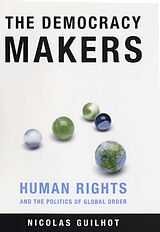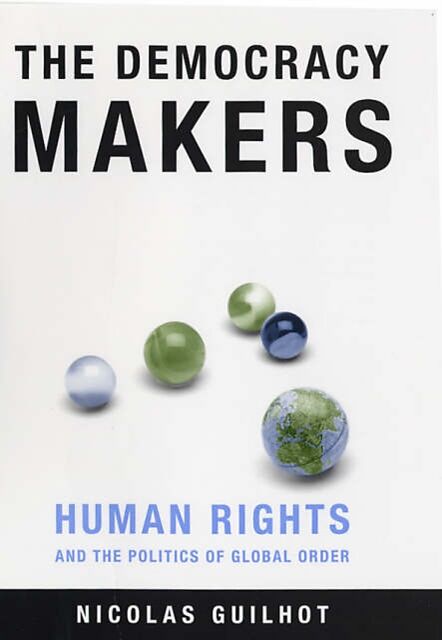The Democracy Makers
Einband:
Fester Einband
EAN:
9780231131247
Untertitel:
Human Rights and the Politics of Global Order
Genre:
Politikwissenschaft
Autor:
Guilhot Nicolas
Herausgeber:
Columbia University Press
Anzahl Seiten:
288
Erscheinungsdatum:
13.04.2005
ISBN:
978-0-231-13124-7
Looks at how the US government, the World Bank, political scientists, NGOs, and various international organizations have appropriated the movement for democracy and human rights to export neoliberal policies. This book charts the various symbolic, ideological, and political meanings that have developed around human rights and democracy movements.
Autorentext
Nicolas Guilhot
Klappentext
Has the international movement for democracy and human rights gone from being a weapon against power to part of the arsenal of power itself? Nicolas Guilhot explores this question in his penetrating look at how the U.S. government, the World Bank, political scientists, NGOs, think tanks, and various international organizations have appropriated the movement for democracy and human rights to export neoliberal policies throughout the world. His work charts the various symbolic, ideological, and political meanings that have developed around human rights and democracy movements. Guilhot suggests that these shifting meanings reflect the transformation of a progressive, emancipatory movement into an industry, dominated by "experts," ensconced in positions of power.Guilhot's story begins in the 1950s when U.S. foreign policy experts promoted human rights and democracy as part of a "democratic international" to fight the spread of communism. Later, the unlikely convergence of anti-Stalinist leftists and the nascent neoconservative movement found a place in the Reagan administration. These "State Department Socialists," as they were known, created policies and organizations that provided financial and technical expertise to democratic movements, but also supported authoritarian, anti-communist regimes, particularly in Latin America.Guilhot also traces the intellectual and social trajectories of key academics, policymakers, and institutions, including Seymour M. Lipset, Jeane Kirkpatrick, the "Chicago Boys," including Milton Friedman, the National Endowment for Democracy, and the Ford Foundation. He examines the ways in which various individuals, or "double agents," were able to occupy pivotal positions at the junction of academe, national, and international institutions, and activist movements. He also pays particular attention to the role of the social sciences in transforming the old anti-Communist crusades into respectable international organizations that promoted progressive and democratic ideals, but did not threaten the strategic and economic goals of Western governments and businesses.Guilhot's purpose is not to disqualify democracy promotion as a conspiratorial activity. Rather he offers new perspectives on the roles of various transnational human rights institutions and the policies they promote. Ultimately, his work proposes a new model for understanding the international politics of legitimate democratic order and the relation between popular resistance to globalization and the "Washington Consensus."
Inhalt
Introduction: The Cosmopolitics of Democratization 1. Civic virtue and the aristocratic project of "global civil society" 2. Idealism and professionalism 3. Double-agents 4. Understanding hegemony 5. A sociology of transnational symbolic power 6. Organization of the bookPart 1: From Cold Warriors to Human Rights Activists 1. The Cold War, the fight against totalitarianism, and the Congress for Cultural Freedom 2. The social sciences and the defense of democracy 3. A temporary set-back 4. From the old Left to neoconservatism: the leftist condottieri of the Cold War 5. A democracy worth defending: scientific premises of political conversion 6. From revolution to counter-revolutionPart 2: The Field of Democracy and Human Rights: Shaping a Professional Arena Around the "Neoliberal" Consensus 1. From the ideological struggles around "human rights" to the "promotion of democracy" 2. The continuation of the Cold War through other means: the National Endowment for Democracy and the rise of the democracy professionals 3. From the Young People Socialist League to the NED: the itinerary of Carl Gershman 4. From moral crusades to professional expertisePart 3: From the Development Engineers to the Democracy Doctors: The Rise and Fall of Modernizatin Theory 1. Cold thought: modernization theory and Cold War policies 2. Modernization as a disciplinary stake 3. The economic production of democracy 4. "A man on the Left": Seymour Martin Lipset and the political meaning of modernity 5. The crisis of modernization theory and the Latin American connection 6. The ambiguous demise of modernization theory 7. Modernization, dependency, democracy: the intellectual trajectory of Guillermo O'Donnell 8. The journey from structuralism to palace strategiesPart 4: Democratization Studies and the Construction of a New Orthodoxy 1. Scholarly institutions, liberal networks and transitions to democracy 2. A farewell to arms: from a critique of the state to a science of elite reformism 3. Imperium honoratiorum 4. A strategic position in the scientific field 5. "Dictatorships and double standards": the neoconservative doctrine 6. Democracy and the Washington consensusPart 5: International Relations Theory and the Emancipatory Narrative of Human Rights Networks 1. The new idealism in the social sciences and international relations 2. The social construction of social constructivism 3. The epistemological production of global moral actors 4. The academic saga of human rights networks and US foreign policy 5. The champions of global civic virtuePart 6: Financing the Construction of "Market Democracies": The World Bank and the Global Supervision of "Good Governance" 1. A history made of reversals 2. Bankers, bureaucrats and economists at the Bank 3. The debt crisis and the Washington consensus 4. From development economics to neoclassical economics 5. Changing patterns of policy legitimation 6. "Good governance" as the structural adjustment of political regimes 7. NGOs, issue networks and policy brokerage Conclusion

Leider konnten wir für diesen Artikel keine Preise ermitteln ...
billigbuch.ch sucht jetzt für Sie die besten Angebote ...
Die aktuellen Verkaufspreise von 6 Onlineshops werden in Realtime abgefragt.
Sie können das gewünschte Produkt anschliessend direkt beim Anbieter Ihrer Wahl bestellen.
Loading...
Die aktuellen Verkaufspreise von 6 Onlineshops werden in Realtime abgefragt.
Sie können das gewünschte Produkt anschliessend direkt beim Anbieter Ihrer Wahl bestellen.
| # | Onlineshop | Preis CHF | Versand CHF | Total CHF | ||
|---|---|---|---|---|---|---|
| 1 | Seller | 0.00 | 0.00 | 0.00 |
